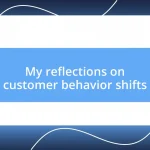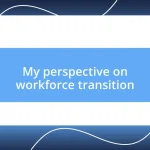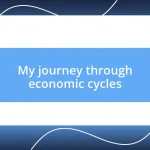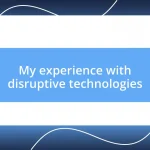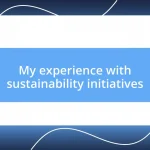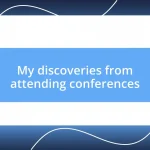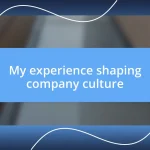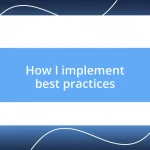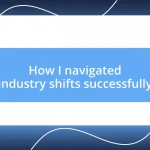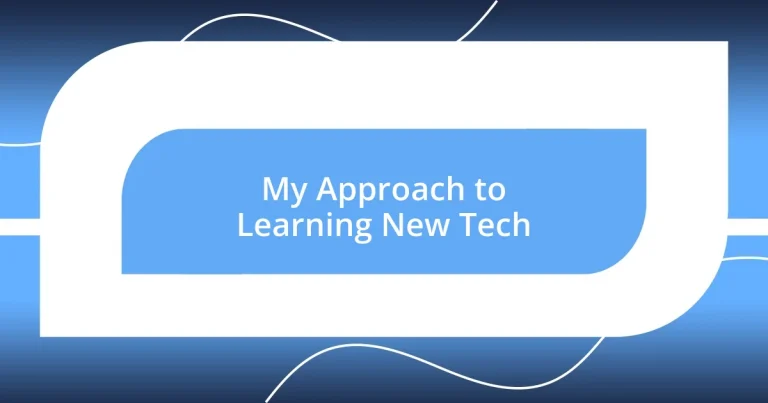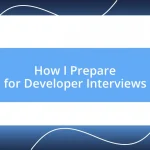Key takeaways:
- Embracing a blend of learning styles can enhance understanding and confidence, for instance through hands-on projects and teaching others.
- Setting clear and structured goals, along with tracking progress through small milestones, can significantly boost motivation and accountability in learning.
- Seeking feedback and mentorship fosters growth, while regularly evaluating progress allows for necessary adjustments to learning strategies.
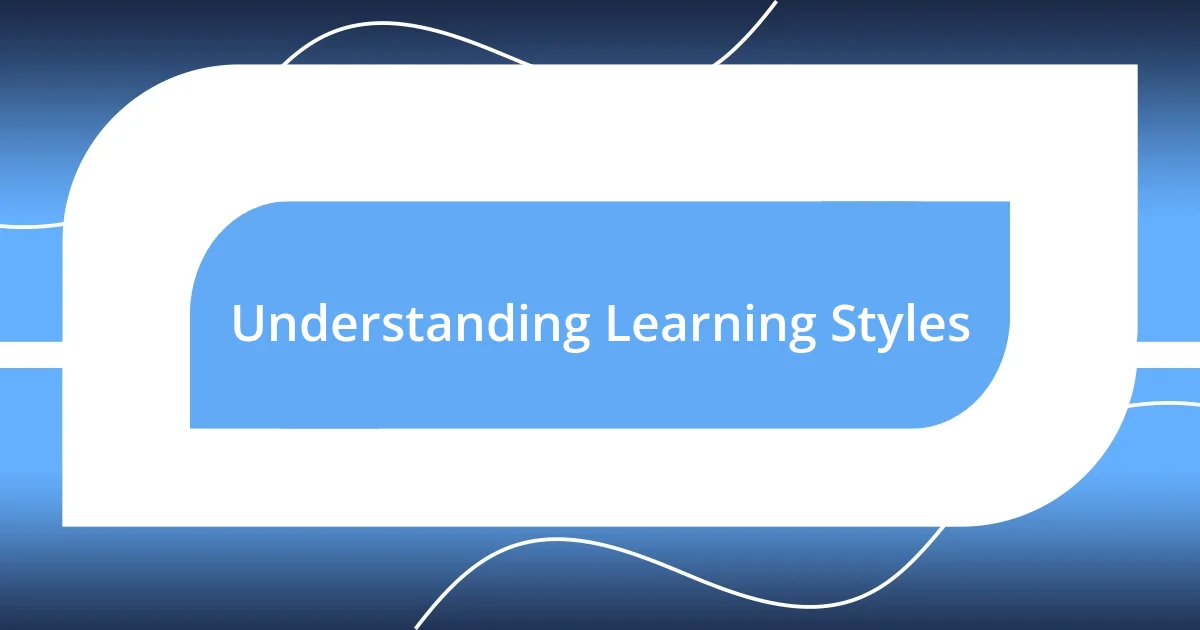
Understanding Learning Styles
When diving into the world of learning styles, I often find myself reflecting on my own experiences. For instance, I vividly remember how much more engaged I was during hands-on projects compared to lectures. It was in those moments, working with my hands, that concepts truly clicked for me. Have you ever experienced that rush of understanding when applying knowledge in a practical setting?
There’s often a debate about whether we should strictly categorize ourselves into one learning style or embrace multiple approaches. Personally, I’ve found that blending styles can lead to deeper comprehension. Sometimes, I’ll read about a topic, then watch videos, and finally teach others. This combination not only reinforces my own understanding but also highlights how versatile our learning can be.
It’s fascinating to consider how learning styles affect our confidence and motivation. I recall a time when I struggled deeply with theoretical concepts in a math class. It wasn’t until I formed a study group that I realized my strength lay in discussing and teaching the material to others. This shift in focus transformed my attitude toward the subject. Do you think adapting your learning style could be the key to overcoming similar challenges?
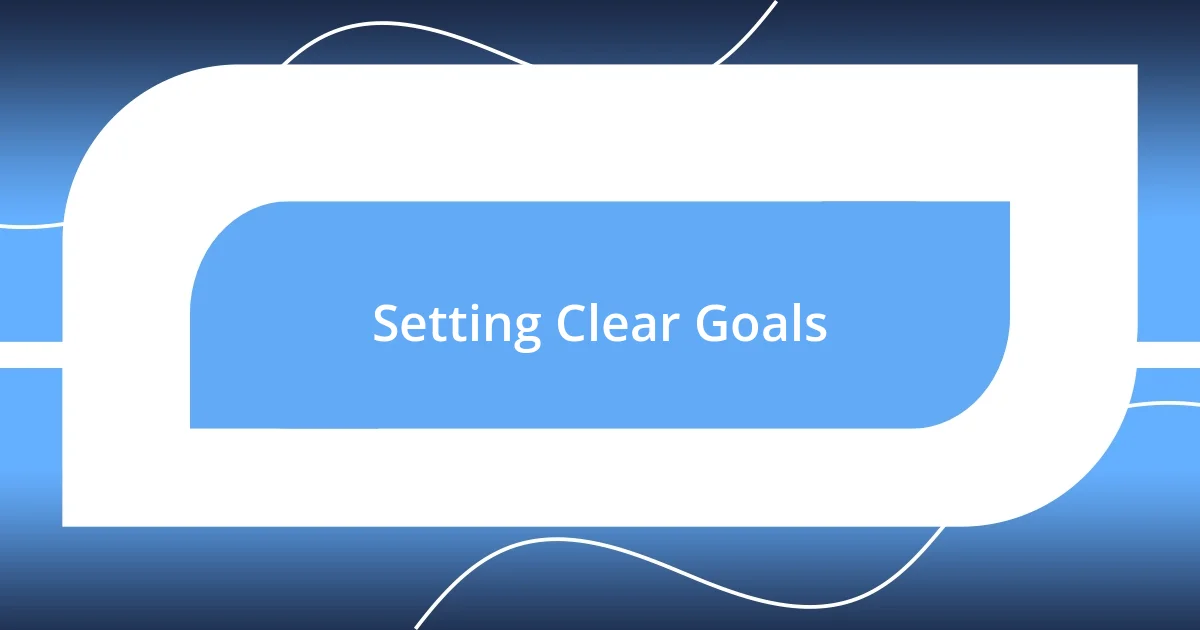
Setting Clear Goals
Setting clear goals is foundational to my approach to learning new technology. When I tackle a new subject, I pinpoint what I want to achieve. For example, when learning a programming language, I begin by determining whether I aim to build a specific project or gain general proficiency. This clarity simplifies my process and keeps my motivation high. Have you ever noticed how much easier it is to stay focused when you have a clear destination in mind?
Sometimes, I set micro-goals alongside larger objectives. Recently, while learning about data analysis tools, I broke my learning into smaller tasks—understanding basic functions, creating my first chart, and finally analyzing a dataset. Each completed task brought a sense of accomplishment, steadily boosting my confidence. It’s amazing to experience that incremental progress; I wonder if you find that tracking small wins helps you, too?
Visualizing my goals in a structured format also enhances my learning journey. I often create tables to compare my current skills with my target proficiency. This not only provides a roadmap but also allows me to monitor my growth visually. Such a method promotes accountability, as I regularly reflect on my progress—something I find profoundly rewarding.
| Goal Type | Example |
|---|---|
| Short-term Goal | Complete an online course on Python basics |
| Medium-term Goal | Build a simple web app using Python |
| Long-term Goal | Become proficient enough to develop a personal project from scratch |
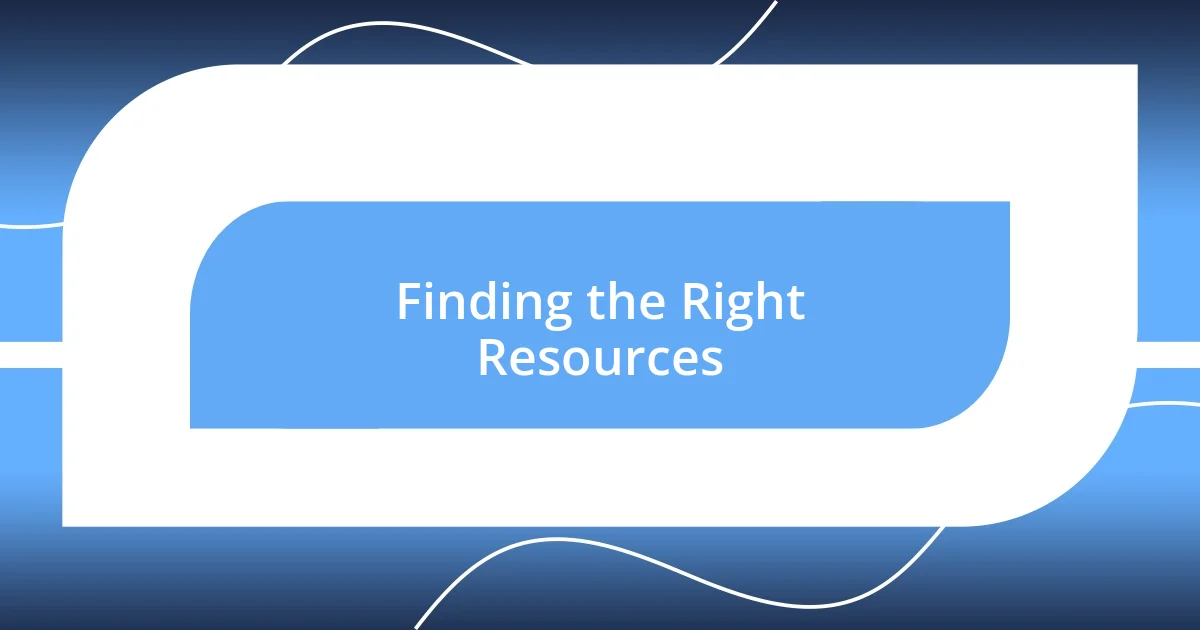
Finding the Right Resources
Finding the right resources is a crucial part of my tech learning journey. I’ve learned that the abundance of information available online can be overwhelming at times. For instance, when I started learning about blockchain technology, I spent hours sifting through articles, videos, and forums. It wasn’t until I discovered curated resources like specific online courses and reliable blogs that I began to make real progress. I think the quality of resources really matters; it truly shapes our understanding. Have you ever noticed how one insightful tutorial can make a complex topic feel accessible?
To help you in your search for effective resources, I’ve found it useful to consider multiple types of learning materials. Here’s a quick list I often refer back to when diving into a new tech subject:
- Online Courses: Platforms like Coursera or Udemy offer structured learning paths.
- YouTube Tutorials: Visual learners can benefit from hands-on demonstrations.
- Technical Blogs: Exploring articles from experts can provide both depth and different perspectives.
- Forums & Communities: Engaging with others on platforms like Reddit or Stack Overflow can clarify doubts and inspire new ideas.
- Books: Sometimes a solid textbook can provide the thorough grounding needed for complex topics.
Each of these resources has its unique benefits, and finding the right mix can make learning feel like an exciting adventure, rather than a daunting task.
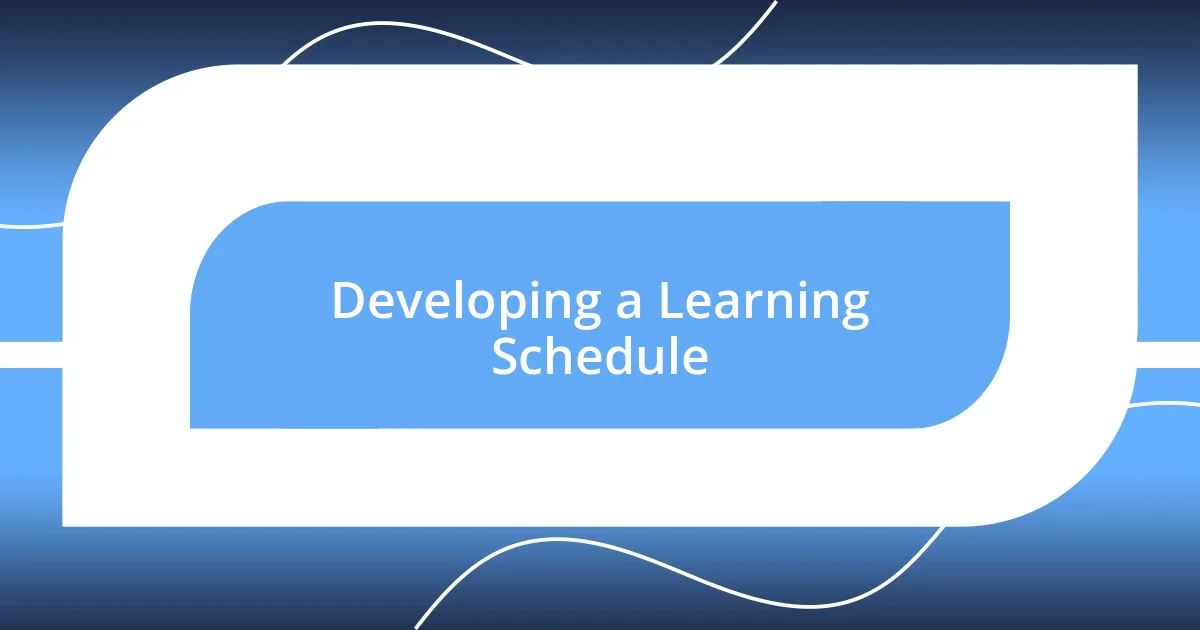
Developing a Learning Schedule
Learning new technology can feel like a vast ocean, and developing a learning schedule becomes my lifeboat. I begin by mapping out specific time slots in my week dedicated solely to learning. For instance, I might allocate Tuesday and Thursday evenings for coding practice and Saturday mornings for exploring new tools. This structure not only keeps me accountable but also turns learning into a consistent habit—something I’ve found essential for retaining complex information. Have you ever tried scheduling your learning? It can transform how you engage with new topics.
In building my schedule, I always consider my energy levels throughout the day. Personally, I’m most alert in the mornings, so I reserve those hours for the challenging concepts that require more focus. Conversely, I find that afternoons are perfect for lighter activities, such as watching tutorials or working through community projects. Tailoring my schedule this way has made learning less draining and much more enjoyable. Don’t you think it’s freeing to shape your schedule based on when you feel most productive?
I also like to build in some flexibility as I stick to my schedule. Life can be unpredictable, and sometimes I need to swap a learning session for an unexpected commitment. Instead of feeling guilty about missed time, I allow myself to adjust the plan so that I can get back on track without stress. For me, this adaptability keeps my enthusiasm high, leading to richer learning experiences. Have you ever considered how a flexible approach can enhance your commitment to learning?
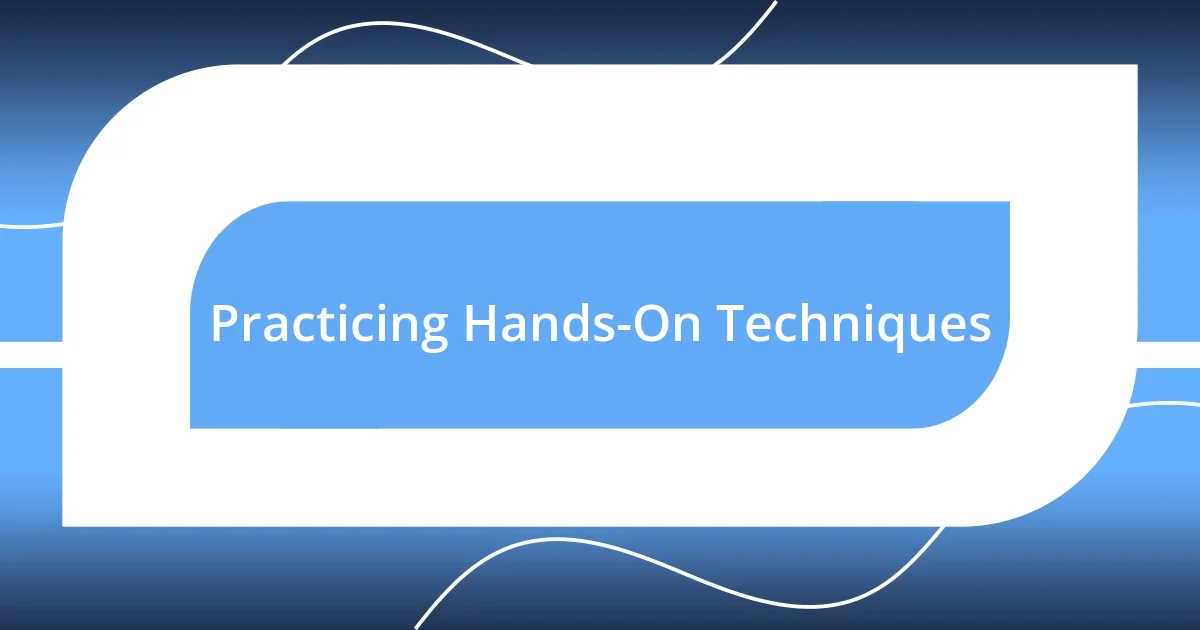
Practicing Hands-On Techniques
Practicing hands-on techniques has always been my preferred approach to mastering new technologies. I remember when I first experimented with web development; rather than just reading tutorials, I jumped straight into building a simple website. The moment I hit a snag in the code, I felt both frustration and excitement. It was in that struggle where true learning emerged, pushing me to research solutions and better understand the underlying principles. Have you ever found that your most significant breakthroughs come when you’re fully engaged in the process?
I also believe in applying what I learn in real-world scenarios. For instance, after studying JavaScript basics, I decided to create a small project—a personal task manager. This project allowed me to implement new skills while encountering practical challenges. Each completed feature brought a sense of accomplishment that deepened my appreciation for the technology. How often do we realize that the best way to gauge our understanding is by transforming knowledge into something tangible?
Additionally, I can’t stress enough the importance of iterative practice. Each time I revisit a technique, I discover nuances that I might have missed before. I recall the time I kept refining my command line skills; what seemed complex at first eventually became second nature. By regularly practicing and tweaking my approach, I built confidence and proficiency. Do you notice how repetition can turn uncertainty into expertise over time?
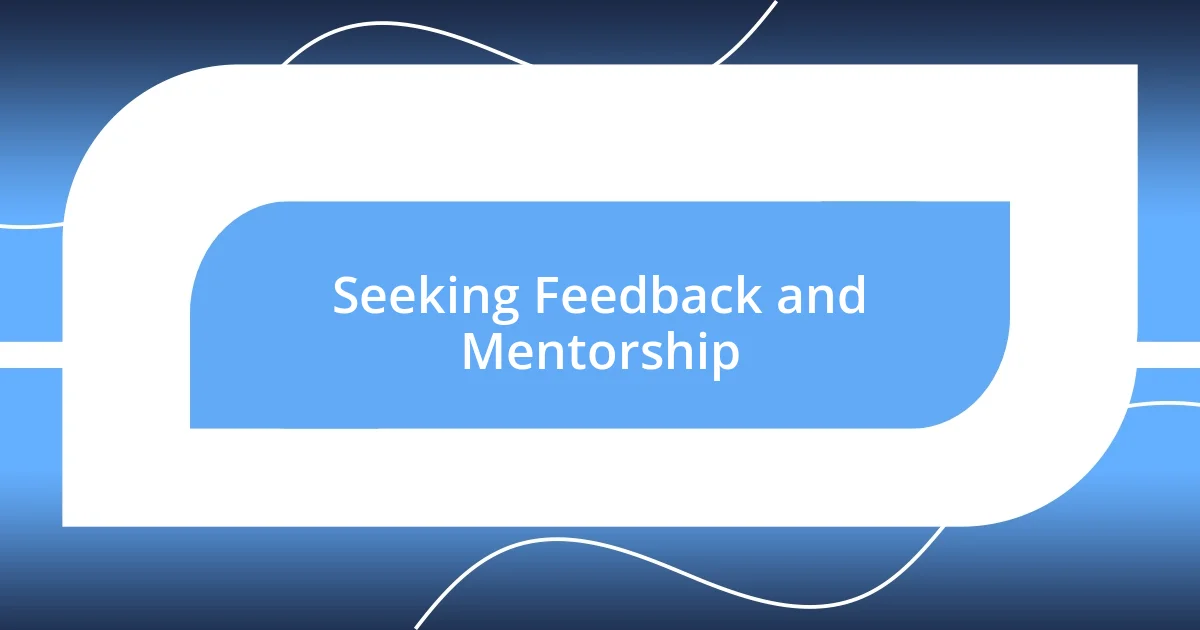
Seeking Feedback and Mentorship
Seeking feedback and mentorship has been crucial in my journey of mastering new technologies. I vividly remember reaching out to a seasoned developer after completing my first coding project. His constructive criticism was a mix of encouragement and guidance—a perfect balance that not only boosted my confidence but also opened my eyes to areas I hadn’t even considered for improvement. Isn’t it amazing how a fresh perspective can illuminate blind spots in our learning?
Finding a mentor can sometimes feel daunting, but I’ve discovered that most individuals are more than willing to share their knowledge. I distinctly recall sending a simple message through a professional networking site to someone whose work I admired. To my surprise, they responded enthusiastically and offered to review my projects. This interaction not only provided me with tailored feedback but also connected me with a network of other learners—something I hadn’t anticipated. Have you thought about the potential benefits of reaching out to someone whose path you admire?
In my experience, seeking feedback isn’t just about receiving advice; it’s also about engaging in meaningful discussions that challenge my thinking. I often participate in coding meetups, where we showcase our projects and invite critiques. The blend of excitement and nerves during these events has become a rite of passage for me. Each piece of feedback, however tough it may be to digest, has propelled my growth in ways that solitary practice never could. How often do we underestimate the power of community in our learning journeys?
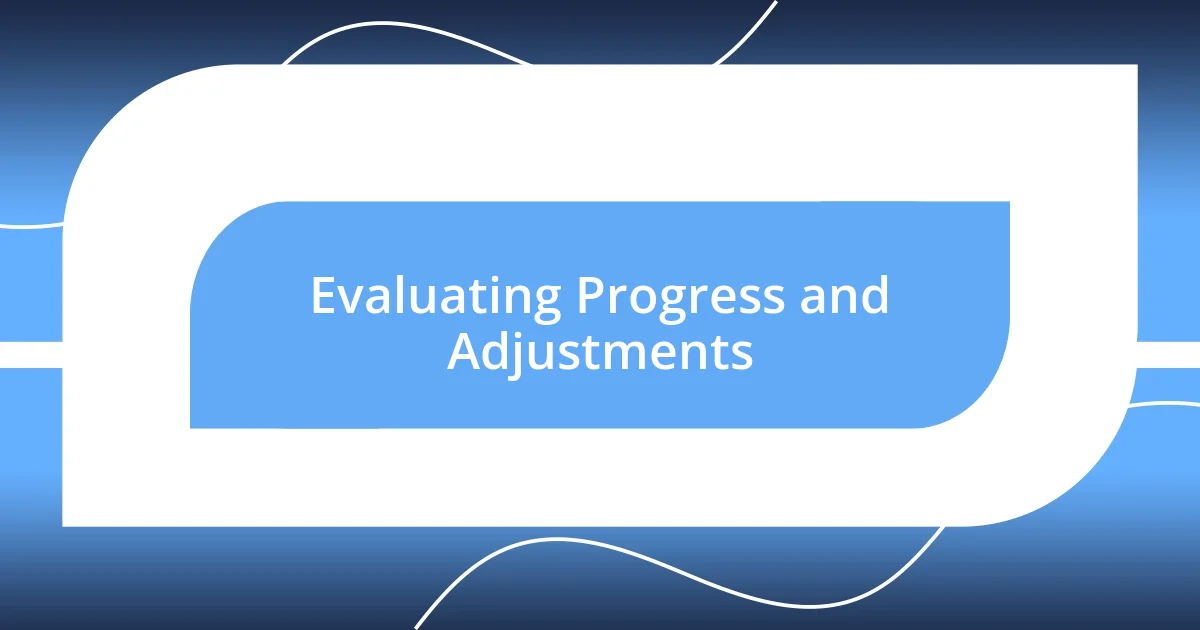
Evaluating Progress and Adjustments
Evaluating my progress has always been an eye-opening part of my learning process. I remember when I undertook a data science course; periodically, I’d set aside time to reflect on what I grasped versus what remained fuzzy. It was during one of these evaluations that I realized my understanding of statistics was shaky, prompting me to adjust my study sessions to focus more on foundational concepts. Have you ever felt the need to revisit the basics to truly excel?
When it comes to adjustments, I thrive on flexibility. There was a moment during my journey to learn Python that I felt stuck and frustrated with the material’s pace. Instead of pushing through with the same method, I pivoted and sought interactive tutorials that aligned better with my learning style. This quick decision not only reignited my motivation but also enhanced my comprehension of complex topics. How important do you think it is to adapt your strategy based on your current experience?
I’ve found that tracking small milestones can be incredibly validating. Each time I completed a project, I’d reward myself with a day off or indulge in a favorite treat. I remember hitting a major milestone when I automated a task that previously consumed hours of my time. It was a moment of pure joy, prompting me to adjust my goals and push my boundaries even further. How do you celebrate your progress, and have you included self-reflection in your learning routine?
